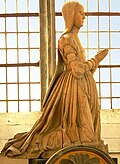Franz (Braunschweig-Lüneburg)
Franz , Duke of Braunschweig-Lüneburg (born November 23, 1508 in Uelzen , † November 23, 1549 in Gifhorn ) was the youngest son of Heinrich the Middle . After a three-year joint reign with his brother Ernst the Confessor reigned from 1539 until his death in 1549 over 10 years of Gifhorn Castle from the newly founded Duchy of Gifhorn . He received the duchy as an inheritance settlement from his brother Ernst.
Life
According to the plans of his father Heinrich the Middle (1468–1532), Franz was later to become Bishop of Hildesheim , but this was impossible due to adverse political constellations.
After his father (who had chosen a defeated French candidate in the imperial election) had left for Paris in 1521 , his two older brothers Otto and Ernst the Confessor ruled the heavily indebted Duchy from Celle .
They gave their underage brother Franz a proper education and sent him to the University of Wittenberg at the age of 16 . When he came of age in 1526, he stayed at the Electoral Saxon court for ten years .
It was shaped by the stately, luxurious life at the Fürstenhof with its festivals, hunting events and trips. Not until 1536 did he return to Celle at the urging of his older brother Ernst (because of his advocacy of Lutheran doctrine ).
Duchy of Gifhorn

When he returned, Franz showed no interest in the government responsibilities expected of him. In addition, the comparatively modest standard of living in the small residence in Celle was not enough for him. As a severance payment, he asked for his own duchy and pushed for a division of the country.
Since his demand for the entire eastern half was unacceptable, among other things because of the duchy's complete over-indebtedness, he only received the offices of Gifhorn , Fallersleben and the Isenhagen monastery near Hankensbüttel in 1539 .
These possessions eventually formed the new Duchy of Gifhorn , which was only of secondary importance in the empire. It was a small, manageable domain in which Duke Franz could pursue his noble self-image and his princely representational duties unhindered. He had Gifhorn Castle expanded as a residence and lived a splendid court life. At the same time he expanded Fallersleben Castle as a rural aristocratic residence.
reformation
Duke Franz and his brother Ernst the Confessor belonged to the alliance of Protestant princes, who declared themselves at the Reichstag in Speyer in 1529 through the protestation of Speyer . Both belonged to the Schmalkaldic League , which supported Martin Luther's ideas .
With the Gifhorn Palace Chapel, Franz created the first sacred building in northwest Germany, which was specially built for Protestant worship .
In 1546 Franz took part in the Schmalkaldic War ; 1542 at the Turkish war . In the Gifhorn area he introduced the Reformation .
marriage
1547 married Duke Franz Klara von Sachsen-Lauenburg , daughter of Duke Magnus I von Sachsen-Lauenburg .
The marriage lasted only three years, however, as Franz died in agony in 1549 on his 41st birthday. The cause was an infection on the foot that did not want to heal , and even an amputation was unable to save his life.
He was buried in the chapel of Gifhorn Castle, where a carved tomb figure can still be found on his sarcophagus . Since the marriage resulted in only two daughters, the Duchy of Gifhorn reverted to the parent company in Celle. In return, his wife, Duchess Klara, received Fallersleben Castle as a widow's residence , where she benefited from the common good of the place. She died in 1576 while visiting Barth and was buried there.
progeny
- Katherine von Braunschweig-Lüneburg-Gifhorn (* 1548 - † December 10, 1565) ∞ Heinrich VI. Burgrave of Meissen, (* December 29, 1536 - † January 22, 1572)
- Clara Duchess of Braunschweig-Lüneburg (* January 1, 1550; † January 26, 1598) ∞ I: Bernhard VII. Prince of Anhalt-Dessau (1540–1570) ∞ II: Bogislaw XIII. Duke of Pomerania (1544–1606)
reception
After him, the city of Franzburg in the district of Vorpommern-Rügen by his son-in-law, Duke Bogislaw XIII. named by Pomerania.
literature
- Fritz Brüggemann: A duke named Franz. The adventurous life of the Imperial Prince Duke Franz of Braunschweig and Lüneburg, Duke in Gifhorn. A factual report. Enke-Verlag, Gifhorn 1973.
Web links
- Text and picture by Duke Franz on the Welfen website at welfen.de
- Text and picture of his brother, Duke Ernst the Confessor, on the Welfen website at welfen.de
- Franz (1508-1549) Duke of Braunschweig - Lüneburg - Gifhorn at welfen.de
| predecessor | Office | successor |
|---|---|---|
| Ernst I. the Confessor |
Duke of Braunschweig-Lüneburg, Prince of Lüneburg 1536–1539 |
Ernst I. the Confessor |
| predecessor | Office | successor |
|---|---|---|
| - |
Duke of Braunschweig-Lüneburg, Prince of Gifhorn 1539–1549 |
- |
| personal data | |
|---|---|
| SURNAME | Franz |
| ALTERNATIVE NAMES | Franz von Braunschweig-Lüneburg |
| BRIEF DESCRIPTION | Duke of Gifhorn (1539–1549) |
| DATE OF BIRTH | November 23, 1508 |
| PLACE OF BIRTH | Uelzen |
| DATE OF DEATH | November 23, 1549 |
| Place of death | Gifhorn |

